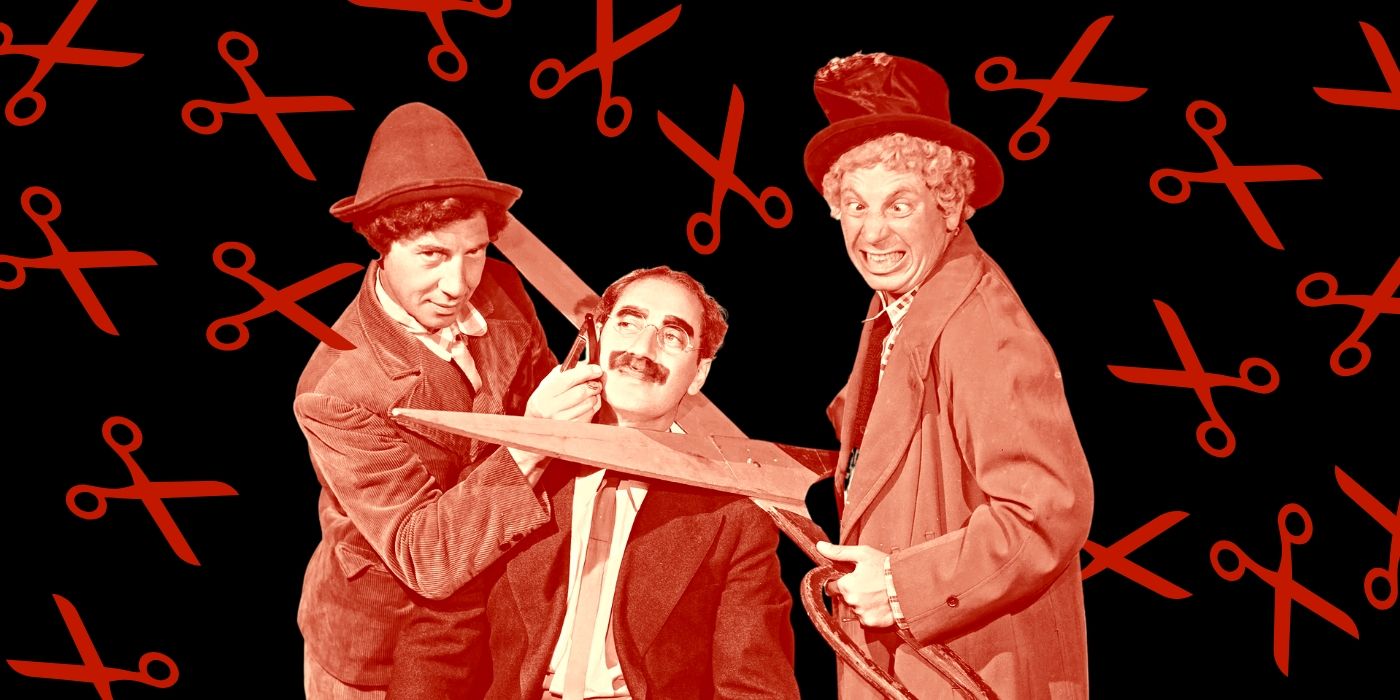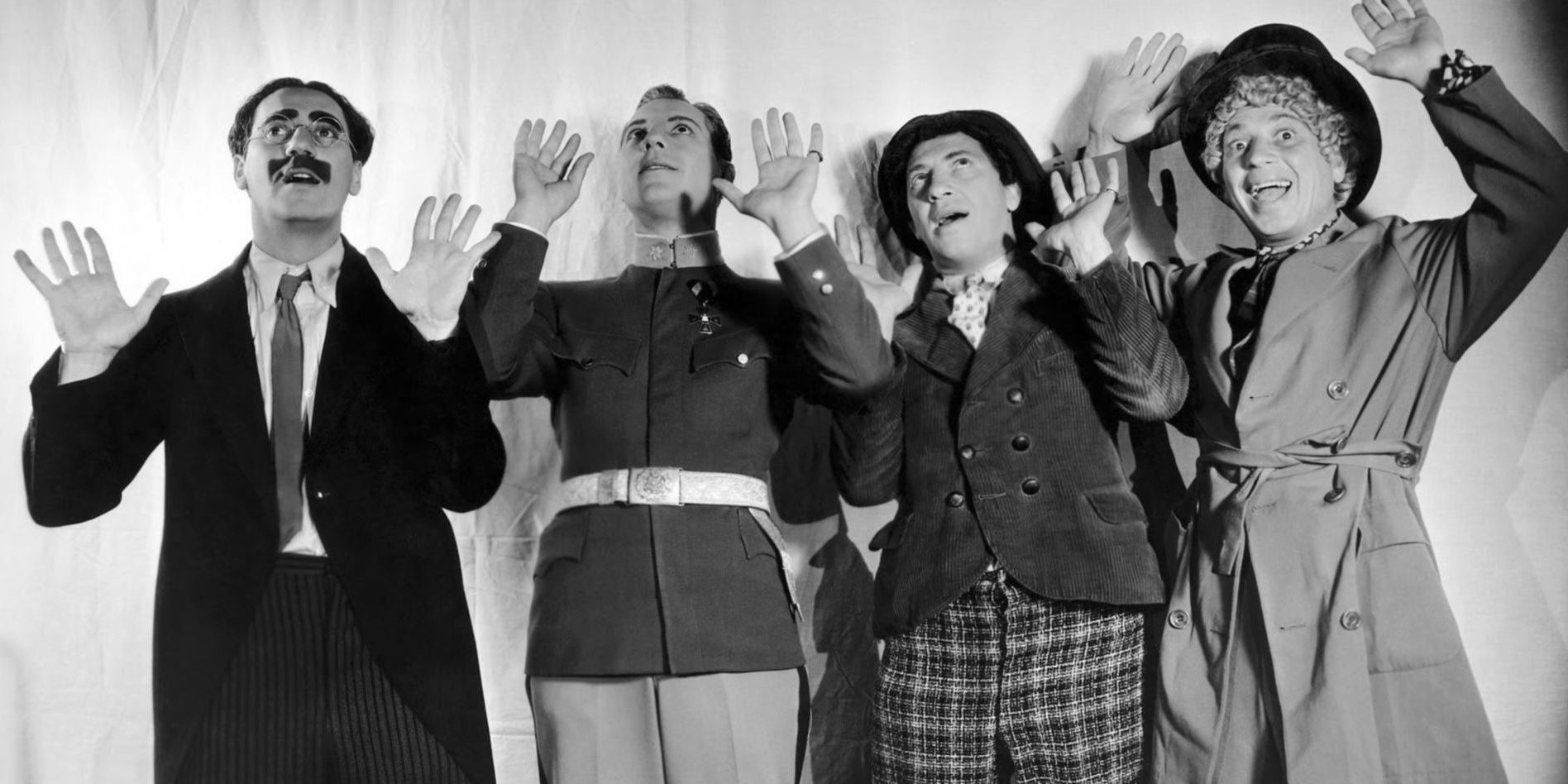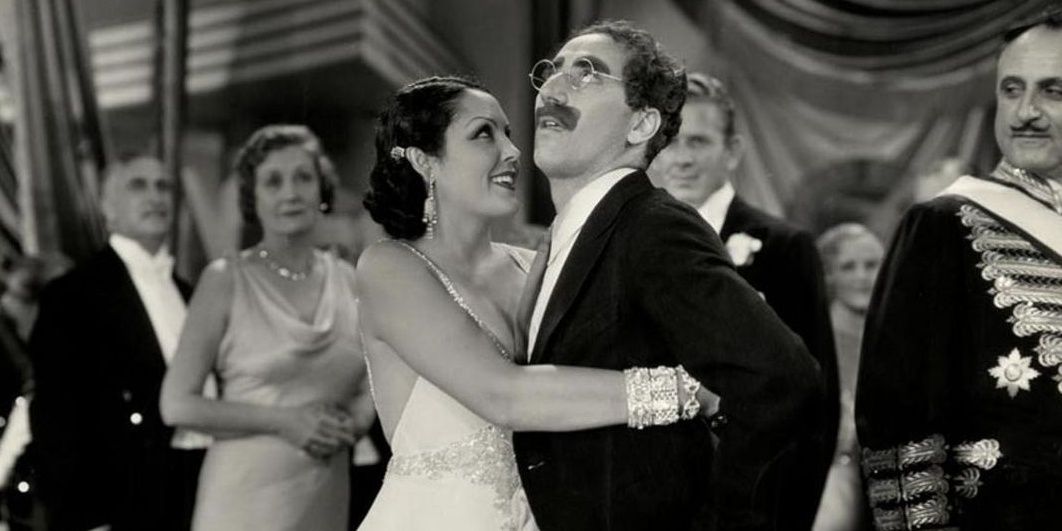The Big Picture
- The Marx Brothers' earliest films for Paramount were primarily focused on showcasing their vaudeville routines, with the camera, design, and direction taking a backseat.
- The Marx Brothers' move to MGM and their collaboration with Irving Thalberg brought about a change in style and a more deliberate selection of behind-the-scenes talent.
- While the Marx Brothers' films at MGM were initially successful and praised, there has been a shift in perception over time, with many classic film fans favoring their earlier films at Paramount.
Newcomers to the madcap world of the Marx Brothers should know that their earliest films for Paramount are, above all else, showcases for routines the brothers had perfected in vaudeville. Camera, design, and even direction take a back seat to what Groucho, Chico, and Harpo (and Zeppo, by technicality) are saying, singing, and dancing. The movies deliver laughs, but with unremarkable and sometimes faulty technical support. Over time, the Marxes developed material for the screen, and the filmmakers around them made greater use of the language and possibilities of the medium, building to the spectacular filmic comedy sequences of Duck Soup. But the kind of careful and deliberate selection of behind-the-scenes talent you might expect for stars as big as the Marx Brothers wasn’t shown them until they signed with MGM and Irving Thalberg.
In their lifetime, the Marx Brothers’ move to Hollywood’s Tiffany studio was seen as a coup. A Night at the Opera and A Day at the Races were their two most successful movies at the box office, and considered by many, for a time, to be their best. Groucho maintained that they were so for the rest of his life. But as the Marx Brothers were rediscovered by young, countercultural audiences in the 1960s and '70s, the standard party line on the Marxian filmography began to change. Duck Soup was now their finest achievement. A Night at the Opera deserved some of its accolades, but the MGM Marx films were increasingly seen as a wrong turn. The studio and Thalberg took a gonzo troupe of no-holds-barred comics and reduced them to eccentric do-gooders in subpar musical “comedies” that pandered to MGM’s “respectable” audiences. And who would prefer that to their rougher shenanigans at Paramount?
That has remained the conventional wisdom about the Marx Brothers among many classic film fans in the years since, and there’s enough commentary to that effect to color perceptions of their films by first-time viewers unaware of the reasons behind the Marxes’ split from Paramount and change in style. So what was behind the move, and did it lead to the brothers’ greatest triumph or the beginning of their decline?
The Marx Brothers Left Paramount at a Critical Point in Their Film Careers
The Marx Brothers came to Hollywood relatively late in life. The eldest, Chico, was over 40 when they made The Cocoanuts in 1929; Zeppo, the youngest, was nearing 30. The brothers’ youth had been spent on the stage. In the often-unforgiving world of vaudeville, they made their name and developed the personas that drove their comedy: Groucho’s mustachioed and acerbic wit, Chico’s ethnic conman, Harpo’s impish and silent clown, and Zeppo’s…well, he got them up to the four advertised brothers. And when they first began making films for Paramount, it was with their established theatrical credentials firmly in mind. The Cocoanuts, and 1930’s Animal Crackers, were adaptations of the Marxes’ Broadway shows. These two films were shot in New York, with the Marxes filming The Cocoanuts at the same time they were performing the stage version of Animal Crackers, and neither film was given much money or thought beyond getting the act on celluloid.
The films did well enough that Paramount brought the Marxes to Hollywood, where they were given new writers and a bit more flair put into the filmmaking. Their scripts were now written for the screen, with some material borrowed or adapted from stage or radio routines. The comedy was still in the same vein as the Marxes’ earlier work: a loose plot (sometimes very loose) threw the brothers against anyone and everyone, including each other. Their individual shticks, and various combinations of the act, showed no mercy in the quest for laughs. Groucho, Chico, and Harpo terrorized their fellow ocean liner passengers in Monkey Business (Zeppo romanced the girl); they burned Huxley College to the ground (literally, in a lost scene) in the college spoof Horse Feathers; and in war picture send-up Duck Soup, every aspect of war and statesmanship, good and bad, came in for a spoofing.
All these films have jump cuts, continuity flubs, and narrative holes and dead ends (made worse for Horse Feathers by censorship over the years). They also have some of the best routines the Marx Brothers ever did. This was the period when they did the famous mirror scene, later recreated in I Love Lucy. It’s when Groucho delivered such gems as “Remember that you’re fighting for this woman’s honor, which is probably more than she ever did!” Horse Feathers has the two best musical numbers for the team, “I’m Against It” and “Everyone Says I Love You,” the latter worked into the plot so that all four brothers get a turn with it.
Contrary to some reports, none of them was a box office flop either. But they did represent diminishing returns, and Duck Soup came in for a particularly hostile public reaction, premiering as it did in the depths of the Great Depression. If the comedy wasn’t seen as offensive in the current economic and political climate, it was considered a repetition of previous movies. Its production took place as the brothers and Paramount were in negotiations for a new contract. The Marx Brothers showed authority little more respect in life than they did while in character, and the Depression did not make Paramount’s higher-ups more generous and amicable. After Duck Soup was released, a new studio chief came in who didn’t like the Marx Brothers. The feeling was mutual, and before 1933 was done, the Marx Brothers were without a studio (and without a junior member; once their contract was up, Zeppo bowed out).
Irving Thalberg Introduced the Marx Brothers to Structure
So there were the now-three Marx Brothers, middle-aged and facing the Depression without a studio contract. The critical and financial performance of Duck Soup left Groucho wondering if he’d be better off as a solo comic actor. Harpo was pressed into a goodwill tour of Russia. And Chico gambled, and in gambling, came across Irving Thalberg.
Thalberg, Hollywood’s Boy Wonder, had been the studio manager for Universal in his 20s, and commanded MGM as production manager in his 30s. He catered to public tastes while still indulging in his own, kept a firm hand on MGM’s stars and directors, and never gave himself credit, even when he personally produced a movie. He wasn’t scouting the Marxes for his studio when he and Chico played cards together, but when Chico said that he didn’t think he and his brothers were as washed up as the critics had said, Thalberg agreed. “You’ve been handled wrong,” he said.
Through Chico, Thalberg summoned the brothers and explained his ideas about film and comedy. As funny as the Marxes’ Paramount films were, he said, they had too many jokes. They came so fast that the audience missed one while laughing at another. And if a joke didn’t land, there was nothing in the ramshackle plot, or the brothers’ heretofore indiscriminate clowning, for an audience to latch onto. The deal he was offering the Marxes? “You get me the laughs, and I’ll get you the story.”
The kind of story Thalberg had in mind was one he likened to a football game. He wanted the home and the opposing teams clear to the audience, and he wanted the view of the endzone unencumbered. And the most exciting games to watch were the ones where the home team seemed destined for a loss, only to turn things around with spectacular plays at the end of the fourth quarter. Groucho, Chico, and Harpo’s established characters could stay as they were, but they would now be a group of down-on-their-luck characters who befriend a young couple in distress, find themselves similarly harassed by the heavy, and then unite in their darkest moment to set things to right – with comedy, of course.
Did Thalberg’s Structure Help or Hurt the Marx Brothers?
Thalberg, never a healthy man, only lived to see two Marx Brothers films into production, A Night at the Opera and A Day at the Races (he died while the latter was in production). Like the later Paramount films, they have some of the most beloved of the brothers’ material. A Night at the Opera has the “sanity clause,” the stateroom scene, and a raucous finale. A Day at the Races has the trio subjecting their long-suffering dowager Margaret Dumont to a ludicrous medical examination. As noted above, they made MGM plenty of money. But the three Marx films the studio produced after Thalberg’s death, which all recycled the playbook he’d developed to some degree, represented another set of diminishing returns, and this time, it wasn’t just because the movies were out of step with the times; they weren’t any good.
Is this proof that Thalberg’s instincts for the Marx Brothers were wrong, that they all just got lucky the first two times? By that logic, Steven Spielberg has culpability in every terrible shark movie made after Jaws. But it doesn’t make much sense to blame a talented filmmaker when second-rate imitators execute their ideas poorly. The Marx Brothers’ screen decline had more to do with the lack of enthusiasm anyone but Thalberg had for them at MGM. The Marxes, who got along well with their producer, felt their enthusiasm for movies fade after his death. Even without a champion, by the '30s, the brothers' age was showing in their films.
As for whether Thalberg’s handling of the Marx Brothers was creatively mistaken – well, that’s a matter of taste, isn’t it? I liken the split between the Paramount and Thalberg-MGM pictures in the Marxes filmography to the difference between Bob Clampett’s Looney Tunes cartoons and those of Chuck Jones. They both made funny animated shorts, they both worked with Daffy Duck and Bugs Bunny (who was partially modeled on Groucho Marx), but their approaches to comedy were quite distinct.
Clampett, like the Paramount Marx films, delighted in anarchy. His cartoons are wild, thinly plotted, rapid-fire in their jokes and indiscriminate in their targets. Jones was more like Thalberg. He relied on structure and pattern, he was more likely to give his films a point (even if it was a silly point), and he always made sure Bugs, at least, was the put-upon party, using his comic gifts as a weapon against bullies and blowhards.
You can find plenty of disagreement about whether Clampett and Jones’s cartoons are better (fueled by their own rivalry), but few would argue that either’s work can’t be funny. Theirs are among the most popular and influential of the Looney Tunes shorts, shaping their reputation and perception among audiences to this day. Personally, I lean more towards Jones (and A Night at the Opera over any of the Paramount Marx movies), but that doesn’t make the Clampett cartoons “wrong” or unfunny.
It's best to treat the studio split with the Marx Brothers in the same way. If the pendulum has swung towards favoring the Paramount movies, that shouldn’t color perceptions of Thalberg’s work with the brothers as a mistake or aberration.



